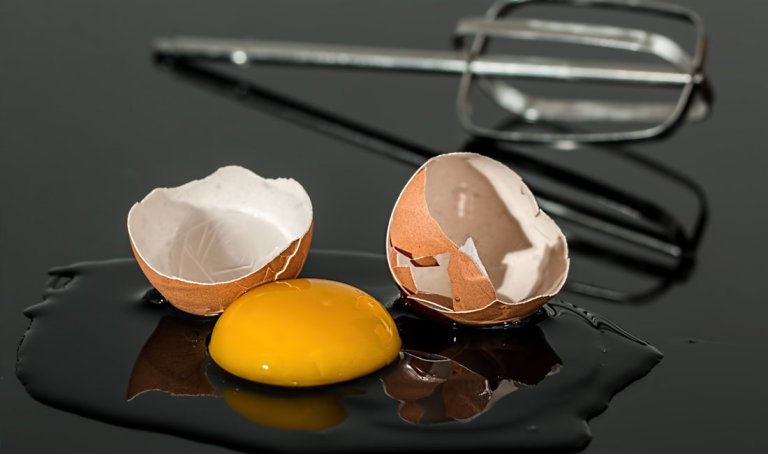Top 3 Reasons Why You’re Not Gaining Muscle
Under each section there are actionable tips that will help you start building muscle!
Let’s dive in:
#1: You Don’t Eat Enough
If you can’t build muscle and are not seeing results, the first place you should look at is your diet. Diet, or nutrition, plays a crucial role in muscle growth.
There is a really good analogy that I love by Alex Carneiro, he asks:
Can you build a house with blueprints, construction workers, but no raw materials? Nope.
Nutrition is the principal element in fitness. Regardless whether we are talking about weight loss or muscle growth, your diet plan is of extremely importance.
Sadly, muscle doesn’t just magically appear on your body.
It requires the right amount, and type, of nutrients in order to grow – this includes carbs, protein and fats.
You can lift weights all you want at the gym, you can gain immense strength, do reps until you turn blue, but until you have your diet in check you’re not really going to see any improvements.
Your goal needs to be a small caloric surplus. Enough to create an anabolic effect and elevate muscle hypertrophy but not too much to make you gain fat, which can be disadvantageous both hormonally and psychologically (as I explain in better detail further in the article).
According to Dr. Jacob Wilson, who ran a number of experiments, extra calories can have an anabolic effect, however there is a ceiling for their positive effects. I really recommend you read his article “Is Bulking Really Necessary?“ where he explains everything in greater detail.
Dr. Wilson also states that you can gain muscle mass without being in a caloric surplus, thus preventing any excess fat gain – it’s just not going to be as much. And as I’ve already touched on the subject you can even build muscle and lose fat at the same time.
He also claims that in his study the group that was overfed a moderate 800 calories received the best results. Essentially presenting the notion that an 800 calorie surplus is an ideal place to be at.
That may be confusing for many as there are quite a lot of fitness experts who claim that a surplus of 300 calories is ideal and more than enough to ensure great results.
I always advocate experimenting – try and see which one delivers the best muscle building results with the least fat gain consequence.
So here’s the thing:
A great place to start is a calorie calculator which you can use to calculate your total daily energy expenditure (TDEE) (here is a good one). Your TDEE shows you how many calories does your body require for its daily activity. This number is based on your age, gender, weight and weekly activity. Being in a caloric surplus of 300-800 calories will help deliver the best muscle building results while mitigating fat gain.
Remember that no calorie calculator out there is going to give you an exact number. You need to find out for yourself how much is too much and how much is too little.
Use a scale and other tools to find out whether you’re gaining weight faster or slower than expected. Consequently, if faster lower your caloric intake, if slower consider increasing it.
Fitness is a learning process. You experiment with different things and based on how YOUR body reacts to certain foods and workouts you make assumptions and apply the necessary controlled action.
Summary:
Diet plays a crucial part in muscle growth. Use a calorie calculator to measure your total daily energy expenditure (TDEE) and be in a 300-800 caloric surplus. This will ensure that you are allowing your body to safely build muscle whilst lowering the amount of body fat you gain.
#2: You’re Not Maximizing Protein Synthesis

Muscle protein synthesis (MPS) is the main driver of muscle growth. Without it muscles won’t grow.
It’s a constant thug of war between protein synthesis and muscle protein breakdown (MPB). The ratio between MPS to MPB determines whether muscle is gained or lost.
MPS lasts for about 36 to 48 hours after exercise.
If you are following a traditional workout split (also known as a bro split) where you exercise one muscle group once per week you are not fully maximizing your protein synthesis potential.
Let me give you an example:
If you train your chest on Monday (obviously), and we know that protein synthesis lasts about 36 to 48 hours, that means that MPS will carry out until Thursday. But you’ve only trained your chest on Monday and have not repeated that muscle group. So, that means that you have missed out on a second MPS window and you have the opportunity to double your muscle growth.
So you just add another chest day to your workout, right?
It’s not that easy.
The hard part when building your workout program is making sure that you give your muscles enough time to rest, which is about 48 hours between workouts. It gets even more complicated when you think about the muscles that intersect each other.
For example, you use your triceps and shoulders when you work out your chest. And you exercise your biceps and traps when you work out your back.
If you don’t give your muscles enough time to rest you are risking over training, slowing down muscle growth or even losing muscle. Not to mention that your workout performance will also go down. If you train your chest and then train your triceps, your triceps would not have fully recovered from your chest session.
So what are you supposed to do?
Probably one of the best workout splits that you can follow that gives your muscles enough time to rest and lets you fully maximize on MPS is the push/pull/legs.
It’s a simple grouping strategy where you group your pushing muscles (chest, triceps and shoulders), pulling muscles (biceps and back), and legs.
I have made a 6 week muscle building workout plan that follow the same split. Check it out if you want.
Summary:
Muscle Protein Synthesis (MPS) is the main driver of muscle growth. Without it you will not gain muscle. It occurs every 36 to 48 hours and as such you need to make sure that you exercise each muscle group more than once per week. A pull/push/legs split is ideal for maximizing MPS.
#3: You’re Not Eating Enough Protein

Protein is the most important nutrient for building muscle. If you are eating too little of it, you are running the risk of not gaining muscle and potentially even losing muscle.
In order for you to grow you need to have an adequate amount of protein in your diet.
Protein is the one macro nutrient responsible for muscle protein synthesis. In fact, it’s the only nutrient required to optimize the anabolic response to protein turnover.
Here is what is interesting:
You would think that with all of the various online fitness gurus, fitness athletes, even fitness companies telling us over, and over, and over again how important protein is, we still tend to not eat enough.
I, myself, have fallen victim to inadequate protein consumption.
What I noticed was quite stressful:
No matter what I did, how hard I trained, or how many calories I ate, I can’t build muscle.
I was confused, I was frustrated and I was pretty close to giving up. It was just not making any sense to me.
In my case:
The main culprit to blame was dietary fiber. I was eating too much fiber that stuffed me up and made it really hard to eat anything else that is an adequate source of protein.
Obviously enough, the lack of protein in my diet was causing me to see no muscle gains.
When it comes to how much protein is enough…
Different experts will provide you with different “protein-benchmarks” that you need to hit in order to grow in size and strength.
According to Alex Carneiro an appropriate amount for people who are trying to pack on some size is approximately 1.3 – 1.5 grams of protein per 1lbs of your body-weight.
However, the most famous rule of thumb out there is that the best place to start is eating 1 gram per 1lbs.
What that means is that if you weigh 180lbs (81.6kg) you should consume anywhere from 180g to 270g of protein.
The truth, however, is not that simple. Not every person is the same.
We all have different genetic constructs and as a result we all operate differently.
What works for you, might not work as well for others and vice versa.
The recommended amount might also be different based on your daily activity and lifestyle. For example, if you’re the type of person who works a physically demanding job, you would probably want to make sure that you eat a bit more protein in order to successfully facilitate muscle development and prevent muscle loss.

Perhaps even consider using supplements such as branched chain amino acids (BCAAs) if you want be more safe.
The best measure to take is to calculate your necessary protein consumption, using a protein calculator, so that you have a rough idea how much protein you will need to eat on a daily basis.
And from there on you can start tweaking your diet so that you are receiving the right amount of protein that matches your body structure and lifestyle.
Summary:
Protein is the most important nutrient for muscle growth. Eating too little protein may be the reason why you are not gaining muscle. Try and eat about 1g per 1lbs. For example, if you weigh 160lbs you should eat 160g of protein.

